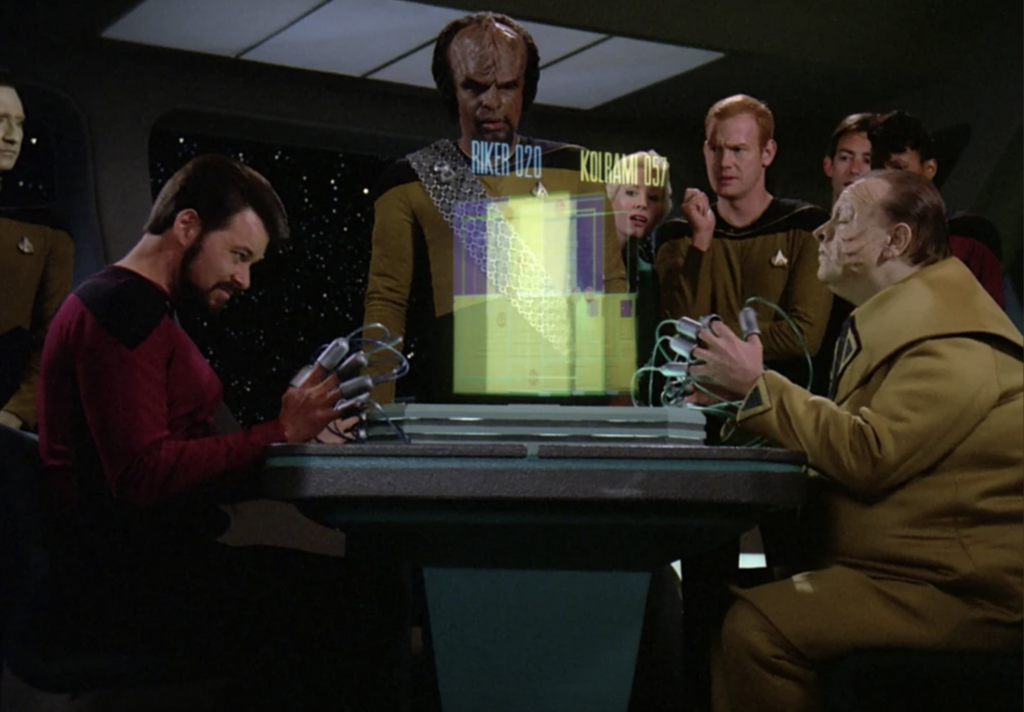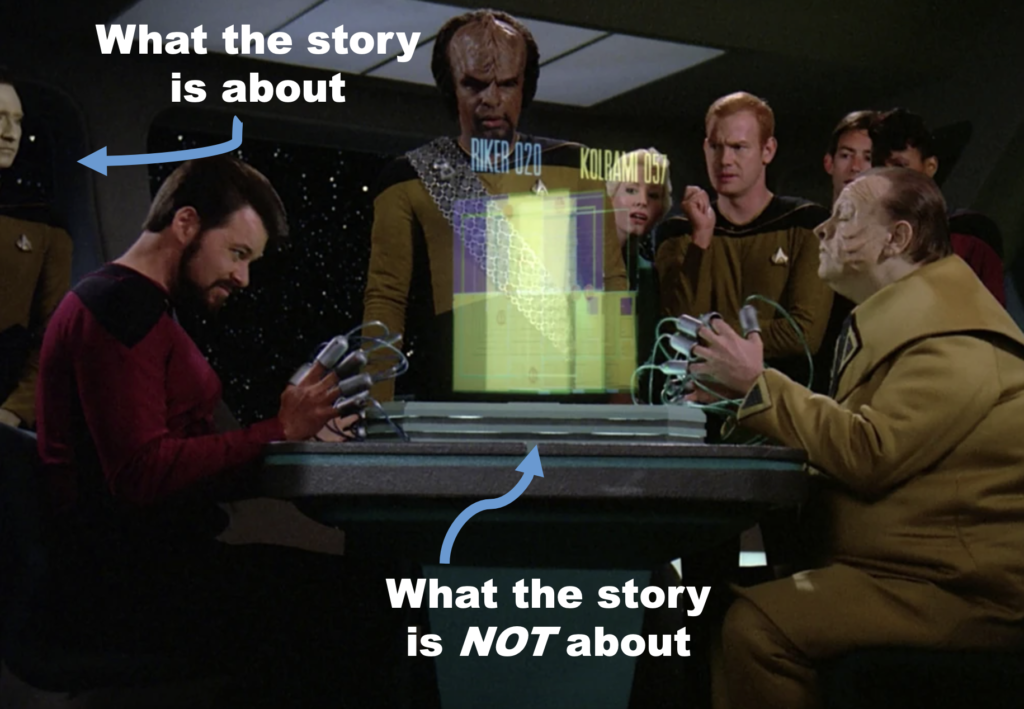I’m in the middle of reading submissions for the GAME ON! anthology that I am co-editing with Tony Pi. While we’re getting some great stories, I’ve begun to see a pattern in some of the stories that aren’t grabbing me.
I thought it might be helpful to those of you planning on submitting to share that insight now—so you can write the best story you can and one that we will hopefully buy for the anthology.
Games But No Characters?
The stories that aren’t working for me are, in many cases, stories about a game and not about the characters playing the game.
Oh, there are characters in the stories, certainly. But they’re only there to move the pieces around the board, deal the cards, or click the buttons on the controllers.
While games and game playing must certainly feature in the stories we will accept for GAME ON!, at their heart, the stories we will publish will be character driven. Think of it as the difference between a story about a game versus a story that involves a game.
A Story That Gets It Right (Write?)
As a writer myself, I sometimes find it hard to wrap my head around editorial advice like that.
So, since I’m the editor this time, I thought it might help to offer a concrete example of a story that does a good job of involving a sci-fi game as a way to better understand and illuminate character.
That story? An overlooked (and, in my opinion, classic) episode from Season 2 of Star Trek: The Next Generation entitled “Peak Performance.”
Through the lens of a futuristic game of strategy, we get character and conflict and action and change. And–as you’ll see by the end of this article–one secret of its success is that the writers understood you don’t need to tell us much about specific rules or how you play to tell an effective story that involves a game.
(PS: While I think I do a good job in this piece of drawing out insights from this episode, do yourself the favor and set aside 44 minutes to watch the whole episode on your streaming service of choice. While there can be some real clunkers in Season 2 of Next Gen, I promise you this is not one of them.)
“Peak Performance” (TNG: S2E21)
The A story in the episode involves the Enterprise taking part in a war-game simulation under the watchful eye of Federation observer and famed strategist Sirna Kolrami, as a way to prepare for an eventual confrontation with the Borg. That storyline is mostly focused on how the crew divides up and prepares for the battle simulation.
But the B storyline—what I really want to focus on—is particularly driven by a game and how it affects the characters. This storyline involves Data’s loss of self-confidence after he is beaten in a game.
Before starting the war game simulation, Commander Riker challenges Kolrami to a game of Strategema. Kolrami is a third-level grandmaster of this futuristic game of strategy and is impressed by Riker’s “audacity” in challenging him. He accepts, noting that playing the game with an opponent of such “limited dimensions” can be “diverting.” This helps set up Kolrami as both arrogant and self-assured (though not without reason) and as a contrast to Data’s own self-doubt later.
The challenge takes place in Ten Forward, with a large audience. Worf informs Riker that he has wagered heavily in the ship’s pool that Riker will take Kolrami past “the sixth plateau.”
Data is intrigued by the Human urge to compete. Dr. Pulaski and La Forge suggest that Data challenge Kolrami to a game of Strategema. Both of them would like to see Kolrami’s smugness taken down a notch.
Riker’s game against Kolrami, however, will do nothing to blunt the alien’s cockiness: it is over almost as soon as it begins. Kolrami wins in a matter of moments and by a large margin (100-23).

Later, Kolrami challenges Data to a game of Strategema (after Dr. Pulaski goads him into it). Their game is more evenly matched, but Kolrami again wins quickly and handily (100-81). He offers Data a rematch. Deanna Troi consoles Data as Pulaski is amazed that Data was beaten.
While Riker describes Kolrami as “the best ever” at Strategema, Data—and his crewmates—are all baffled as to how mere flesh and blood could beat Data’s positronic brain.
Data, who is supposed to be the acting First Officer during the war game, retreats to his quarters, certain that he is damaged in some fashion. He’s convinced he will be a liability during the exercise and removes himself from bridge duty.
Troi tries to counsel him to learn from his mistakes. But Data has performed a diagnostic of his systems and found that he has made no mistakes, and therefore his deductive capabilities should be questioned.
Pulaski later tells Data that he should rebound from his loss rather than sulking and licking his wounds. But Data is still concerned about giving unsound advice.
Here we see the “Yes, but…” and “No, and…” try-fail cycles of fiction that ratchet up the tension.
With both Troi and Pulaski unable to fix the situation the viewer is left wondering: is Data actually broken? If not, how is he to be convinced to return to duty in time for the war game?
It falls to Picard (naturally) to give him a pep talk and snap him out of his funk. In doing so, Picard utters one of the great lines in all of Star Trek (and one that, I personally think, holds up to any of the great lines in English drama and literature):
“It is possible to commit no mistakes and still lose. That is not a weakness. That is life.”
With Data back on the job, the A storyline then plays out.
Troi and Data theorize about how ‘Captain’ Riker, commanding the 80-year-old starcruiser Hathaway, will approach battle strategy in the upcoming simulation.
Data formulates the premise that based on previous examples of Riker in combat he will employ unorthodox strategy. (NB: This actually does tie nicely into the way Riker eventually defeats the Borg at the end of the next season—but that’s a nerdy deep dive for another time…)
Then we get to see the war game: a surprise from the Ferengi, a bit of Klingon guile, and some unorthodox strategy from Riker that helps wrap up the A story.
We then get the conclusion of the B story: a frenzied game of Strategma, already in progress in Ten Forward.
Well, it’s frenzied for Kolrami, anyway. Data is as cool as a digital cucumber. He has taken Kolrami up on his earlier offer of a rematch and this time the android is holding his own.
As Data’s crewmates cheer him on, we see the scores ticking upward rapidly—each player passes the 33,000-point range.
Then Kolrami slams down his controls and suspends the game. He resigns in a huff. “You have made a mockery of me!” he shouts and stalks away.
The crew is elated.
Data explains that he formulated a new premise for playing Strategma and adopted some unorthodox strategy of his own. Instead of playing to win the game (which would be Kolrami’s intention), Data played for a stalemate.
By passing up obvious avenues of advancement and simply countering Kolrami’s own advances again and again, he was able to avoid both defeat and victory and prolong the game.
Data says that though he had not strictly defeated Kolrami, he should be able to challenge him indefinitely.
Roll credits.
How Strategma Illustrates Character
So, what’s the B storyline in this episode really about? It’s about Data’s loss of self-confidence and how he gets it back. It’s about character. It’s a classic Man-in-a-Hole plot (err, Android-in-a-Hole?)
What is the story not about? Strategema.
That doesn’t mean Strategema isn’t important to the episode: it’s the lens or the crucible through which we test and learn about the character of Data.
But what we don’t spend much time learning about in this episode is how to play Strategema. Here is everything we know about Strategema from dialog and context in the episode:
- It is a 3D holographic game between two players
- You play it using sensors on each finger (a surprisingly tethered game for the 24th Century…)
- It has Grandmasters of various ranks (e.g.: third-level grandmaster, etc.)
- First player to 100 wins…unless the score remains close enough that they must keep playing
- The game involves something called the “sixth plateau” (and so, presumably, a first through fifth plateau as well)
- No game has ever gone as high as the one that Data and Kolrami play
That’s it.
And why? Because that’s all we need to know about the game for it to shed light on the character of Data and his crewmates. Do you know how to play? Do you care either way? Of course not! And that’s because the story isn’t about the game; it’s about what we learn about characters through the game.

This isn’t to say that a fascinating story can’t be written that’s more specifically about the rules of a game. But, on the whole, stories that are just thinly veiled explanations of how to play a game, even a made-up one, just aren’t that interesting.
Using a game or games to illuminate some aspect of a character or characters is going to yield a more satisfying story—and one with the best chance of finding a place in GAME ON!
If you have a character-driven story about games, game playing, or games in culture, you can submit it here. We pay SFWA pro rates, we’re open until Dec 31, 2022, and we take up to 3 submissions per author.
